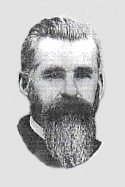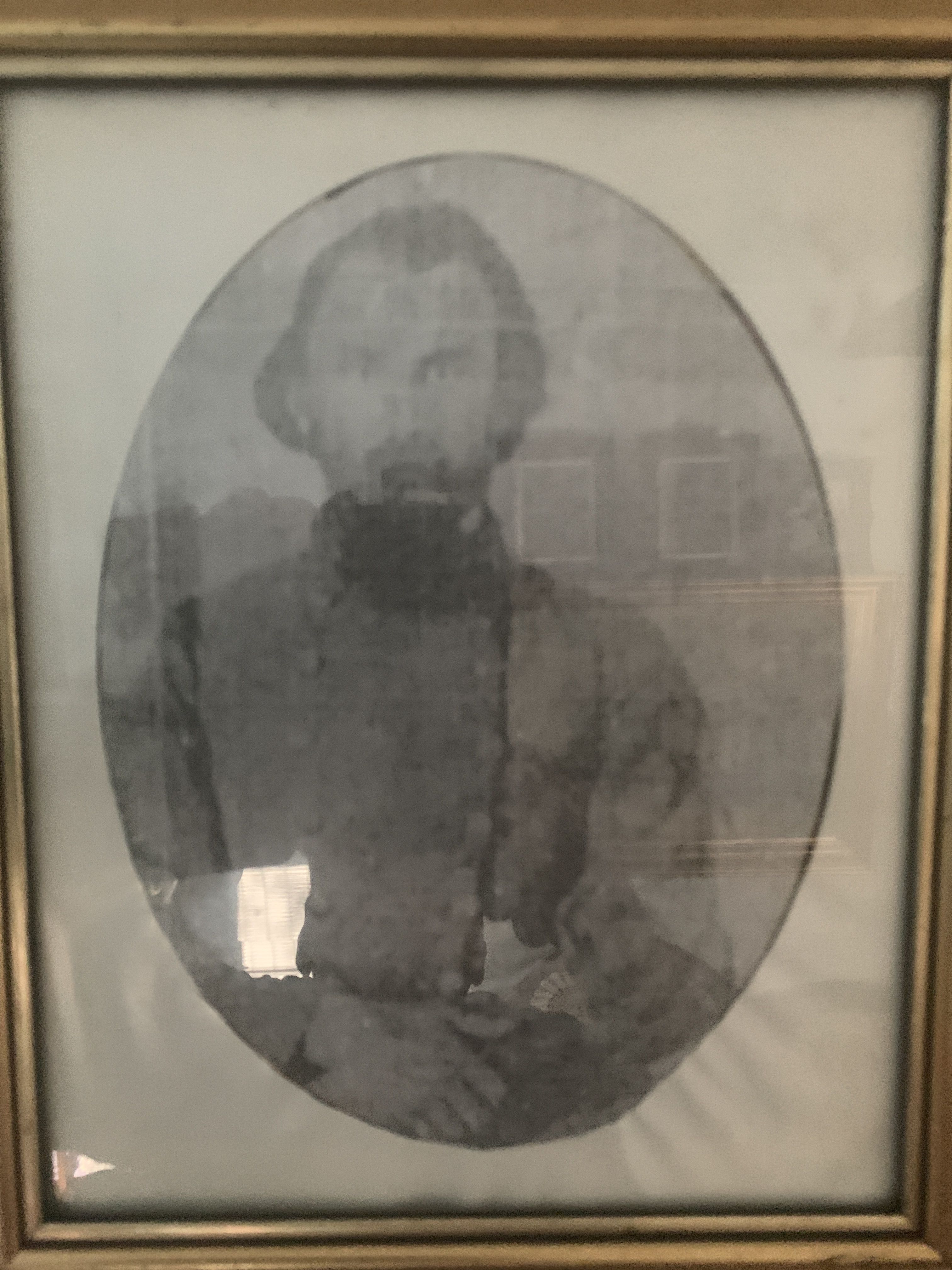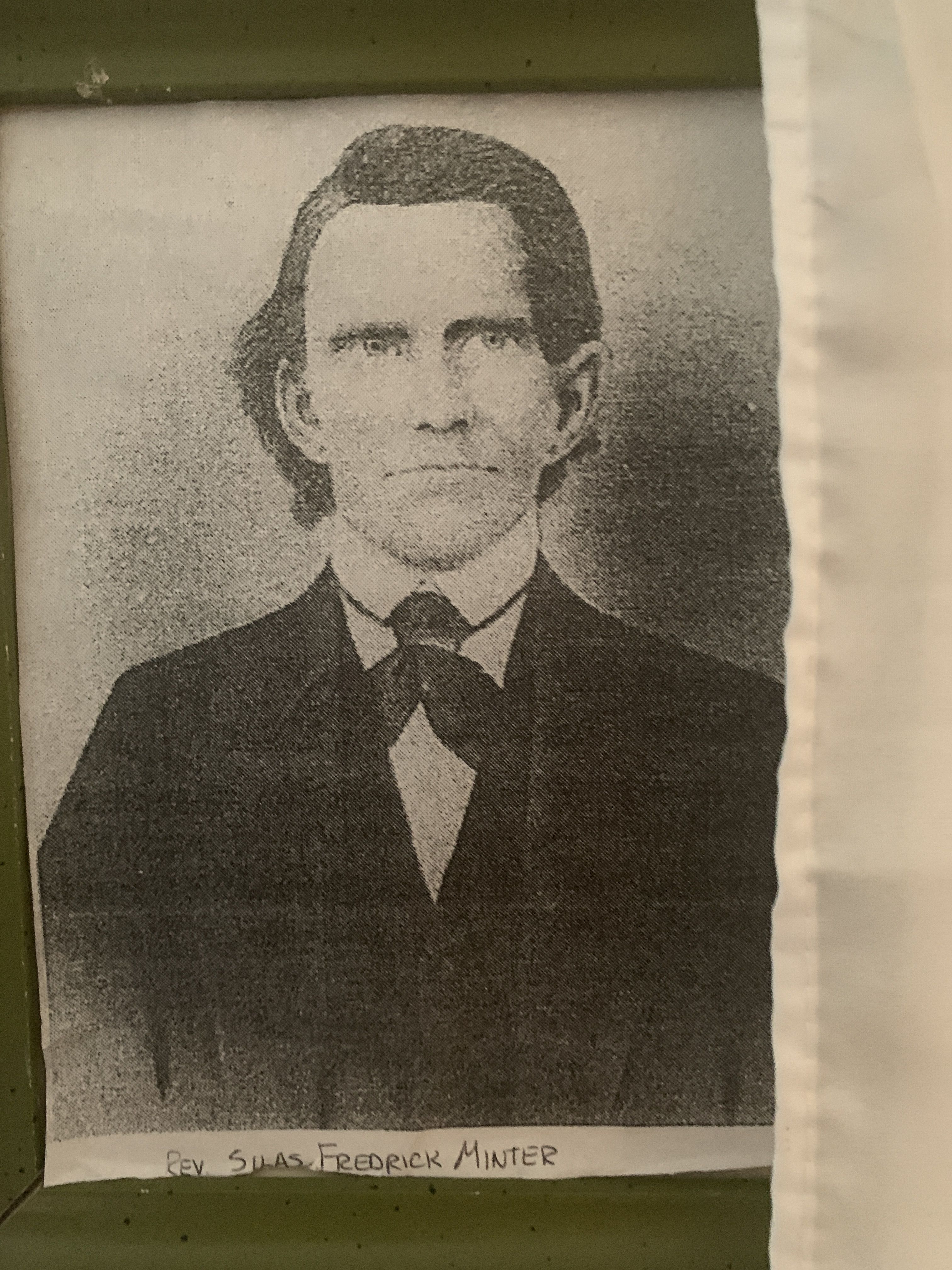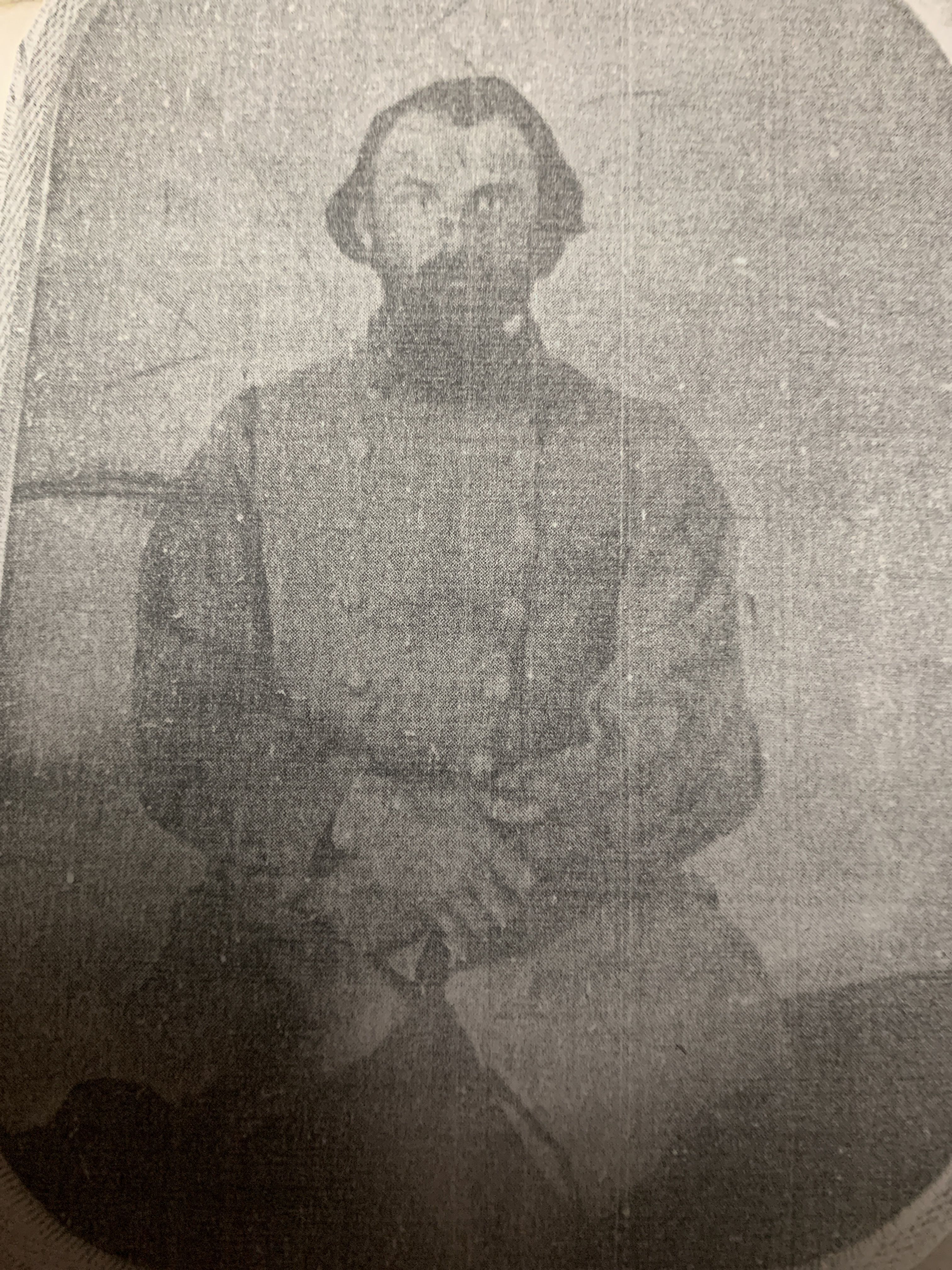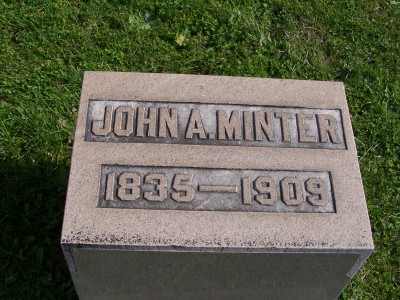Volume III
JOHN ABNER MINTER, D. D. [1835-1909]
Religious Activity in MIssouri 1872-1909
Rev. A. P. Stone
John Abner Minter was born in Henry County, Virginia, November 29, 1835. He came of substantial stock. His father, Silas Minter, was an anti-mission Baptist preacher, was held in high esteem, owned a plantation upon which he reared a large family, John being the youngest of the boys. His mother died while he was quite small. He grew up as a bold, self-assertive youth, and as he regretted to say, at times was rather reckless. He received a fair education for his time and opportunities.
On March 9, 1856, he was married to Miss Eliza Ziegler of Stokes County, North Carolina. He. now threw himself into the current of world events. The west, so full of adventure, then attracted him, and, in 1859, with his young wife, he landed in Colorado where he spent some time amid the strenuous surroundings of frontier life.
Rumors of Civil War were agitating our Nation. Young Minter was no idle onlooker, so when that dreadful strife began we find him at Montgomery, Alabama. He was in the room with the President of the Confederacy when the telegram came announcing the opening of hostilities. He was at once commissioned as colonel and bears the distinction of being one of only two men who received colonel's commission directly from the hand of Jefferson Davis.
He was a brave soldier, won distinction, was captured, exchanged and served to the close of the war under the leadership of General Joseph E. Johnston. Though he fought in many of the deadliest battles he came out without a scratch, which fact he often humbly ascribed to God's special mercy and care.
After the war he engaged in business in Memphis, Tennessee. From here he moved, in 1866, to Lewis County, Missouri, and began business near the present site of Lewistown. Soon be gave up business and began teaching. His wife had been praying that he might be converted and preach, if it was God's will. It was while teaching here that he was converted in a meeting at Corinth (now Lewiston) Baptist Church, which was conducted by Rev. J. M. Rowe and Rev. James (Uncle Jimmy) Lillard. Here he was baptized by Rev. J. M. Rowe. From the time of his conversion he felt God's call to the ministry, was licensed to preach, and a few months later, November 25, 1871, was ordained to the ministry. Rev. James W. Griffith was set apart at the same time and place.
Soon he moved to Canton, Missouri, where he lived, except for a brief residence in LaGrange, until his death.
During his over thirty-seven years' ministry he was pastor of more than twenty-five churches. These churches are all in Northeast, Missouri except some two or three nearby in Illinois. We give the names of most of them: Shiloh, Canton, Gregory, Alexandria, St. Francisville, Wayland, New Prospect, Bear Creek, Gorin, Wyaconda, Edinburg, Memphis, Coffee, Queen City, Philadelphia, Dover, Gilead, Emerson, Maywood and South Union. He was pastor of Shiloh for more than twenty-seven years, served as missionary for Wyaconda, Pleasant Grove and North Missouri associations, and for awhile was financial agent of LaGrange College of which school he was a trustee for sixteen years.
Over twelve hundred souls were baptized by him, hundreds more he saw baptized by pastors whom he assisted in meetings. Under his ministry three churches were organized and three church houses erected.
September 8, 1892, Eliza Ziegler Minter, his wife, died. No children were born into their home. But they loved children. Georgia Kennedy (Scott) was taken at thirteen years of age and kept for seven or eight years. Later they adopted little seven-year-old Julia Shumaker, now the wife of Rev. A. P. Stone, who received their paternal care to the close of their lives. Also her brother, W. L. Shumaker, spent many months with his sister while receiving his early education.
On October 8, 1893, he was again married to Miss Minnie Buford of LaBelle, Missouri, who survives him. In the closing years of his life he suffered much. He sought relief in many ways and had gone to the Baptist Hospital, St. Louis, from whence on April 16, 1909, he went from earth surrounded by friends, his wife, daughter, her husband and their little son.
His body was laid. to rest in the cemetery at Canton, amidst a multitude of sorrowing loved ones, friends and neighbors whose confidence he had won by a life of nearly forty years in their midst. His funeral was conducted by his pastor, Rev. Russell B. Whiteside, assisted by Dr. A. S. Ingram and Rev. G. A. Crouch, his longtime friends and co-workers in the Gospel.
John A. Minter was a strong, distinct personality, positive, stern and, on occasion, dogmatic. As a man of honor he scorned littleness, deceit, fraud, insincerity. He knew God as well as his Bible, Baptist teachings and polity: He loved to dwell upon eternal verities that should outstand the everlasting hills.
His strong memory enabled him to give a ready "Thus saith the Lord" to the astonishment of his hearers and the confusion of gainsayers. He was constantly seeking new light on the Gospel, even to the last, yet he waged a holy, ceaseless war against destructive criticism, heresies, and all who brought dishonor upon "The faith once for all delivered to the Saints" or sought to steal away his Lord.
He was a man of faith. This writer and he started to hold a meeting with one of his churches. We noticed that he was taking his baptismal suit and said, "Are you sure you will need that?" "Yes," he said. "God keeps His promise. You will preach the Gospel; souls will be saved, and I shall baptize them." This was even so over and over again in other meetings later.
While in a meeting at New Prospect, God's spirit seemed to be grieved. He said, "Let us pray." He plead that God might remove the hindrance, even though it be himself. In a few hours he was deathly sick and did not get to service again. Someone tried to joke him at this answer to his prayer. He said, "I have proved that God answers my prayers." His humor and wit is well known by friends.
After a temperance lecture he arose and said: "Is there a man here who can take even a teaspoonful of liquor and not feel it." Two hands went up. He said: "It is a fact that alcohol always affects brain. If there is no such effect it denotes the utter absence of brain." The people were convulsed with laughter. The men threatened violence, but went their way.
His courage was never doubted by those who knew him. Some vile men came into church where he was holding service and began to play cards. He walked straight to them and said: "I will kick you out of this house if you try that again. Jesus cast out devils, and I will, too." They quit.
His generosity was felt in every department of the Lord's work and in needy calls. Though virile in makeup yet he was often tender as a child. He was a man among men, held in high esteem among his brethren in the ministry. The constant friend of young preachers, numbers of whom he assisted in ordaining and whom he helped, and who now, and will, rise to honor his memory.
He was strong, valuable in the counsels of his brethren, devoted and true in his home, and maintained an integrity that compelled the respect of his foes as well as the esteem of his friends.
Probably no man's life is more impressed upon the community where he lived and wrought. "Well done, good and faithful servant," rest in peace. We cherish the fond hope of a reunion beyond.
-------------------------
Volume III
JOHN ABNER MINTER, D. D. [1835-1909]
Religious Activity in MIssouri 1872-1909
Rev. A. P. Stone
John Abner Minter was born in Henry County, Virginia, November 29, 1835. He came of substantial stock. His father, Silas Minter, was an anti-mission Baptist preacher, was held in high esteem, owned a plantation upon which he reared a large family, John being the youngest of the boys. His mother died while he was quite small. He grew up as a bold, self-assertive youth, and as he regretted to say, at times was rather reckless. He received a fair education for his time and opportunities.
On March 9, 1856, he was married to Miss Eliza Ziegler of Stokes County, North Carolina. He. now threw himself into the current of world events. The west, so full of adventure, then attracted him, and, in 1859, with his young wife, he landed in Colorado where he spent some time amid the strenuous surroundings of frontier life.
Rumors of Civil War were agitating our Nation. Young Minter was no idle onlooker, so when that dreadful strife began we find him at Montgomery, Alabama. He was in the room with the President of the Confederacy when the telegram came announcing the opening of hostilities. He was at once commissioned as colonel and bears the distinction of being one of only two men who received colonel's commission directly from the hand of Jefferson Davis.
He was a brave soldier, won distinction, was captured, exchanged and served to the close of the war under the leadership of General Joseph E. Johnston. Though he fought in many of the deadliest battles he came out without a scratch, which fact he often humbly ascribed to God's special mercy and care.
After the war he engaged in business in Memphis, Tennessee. From here he moved, in 1866, to Lewis County, Missouri, and began business near the present site of Lewistown. Soon be gave up business and began teaching. His wife had been praying that he might be converted and preach, if it was God's will. It was while teaching here that he was converted in a meeting at Corinth (now Lewiston) Baptist Church, which was conducted by Rev. J. M. Rowe and Rev. James (Uncle Jimmy) Lillard. Here he was baptized by Rev. J. M. Rowe. From the time of his conversion he felt God's call to the ministry, was licensed to preach, and a few months later, November 25, 1871, was ordained to the ministry. Rev. James W. Griffith was set apart at the same time and place.
Soon he moved to Canton, Missouri, where he lived, except for a brief residence in LaGrange, until his death.
During his over thirty-seven years' ministry he was pastor of more than twenty-five churches. These churches are all in Northeast, Missouri except some two or three nearby in Illinois. We give the names of most of them: Shiloh, Canton, Gregory, Alexandria, St. Francisville, Wayland, New Prospect, Bear Creek, Gorin, Wyaconda, Edinburg, Memphis, Coffee, Queen City, Philadelphia, Dover, Gilead, Emerson, Maywood and South Union. He was pastor of Shiloh for more than twenty-seven years, served as missionary for Wyaconda, Pleasant Grove and North Missouri associations, and for awhile was financial agent of LaGrange College of which school he was a trustee for sixteen years.
Over twelve hundred souls were baptized by him, hundreds more he saw baptized by pastors whom he assisted in meetings. Under his ministry three churches were organized and three church houses erected.
September 8, 1892, Eliza Ziegler Minter, his wife, died. No children were born into their home. But they loved children. Georgia Kennedy (Scott) was taken at thirteen years of age and kept for seven or eight years. Later they adopted little seven-year-old Julia Shumaker, now the wife of Rev. A. P. Stone, who received their paternal care to the close of their lives. Also her brother, W. L. Shumaker, spent many months with his sister while receiving his early education.
On October 8, 1893, he was again married to Miss Minnie Buford of LaBelle, Missouri, who survives him. In the closing years of his life he suffered much. He sought relief in many ways and had gone to the Baptist Hospital, St. Louis, from whence on April 16, 1909, he went from earth surrounded by friends, his wife, daughter, her husband and their little son.
His body was laid. to rest in the cemetery at Canton, amidst a multitude of sorrowing loved ones, friends and neighbors whose confidence he had won by a life of nearly forty years in their midst. His funeral was conducted by his pastor, Rev. Russell B. Whiteside, assisted by Dr. A. S. Ingram and Rev. G. A. Crouch, his longtime friends and co-workers in the Gospel.
John A. Minter was a strong, distinct personality, positive, stern and, on occasion, dogmatic. As a man of honor he scorned littleness, deceit, fraud, insincerity. He knew God as well as his Bible, Baptist teachings and polity: He loved to dwell upon eternal verities that should outstand the everlasting hills.
His strong memory enabled him to give a ready "Thus saith the Lord" to the astonishment of his hearers and the confusion of gainsayers. He was constantly seeking new light on the Gospel, even to the last, yet he waged a holy, ceaseless war against destructive criticism, heresies, and all who brought dishonor upon "The faith once for all delivered to the Saints" or sought to steal away his Lord.
He was a man of faith. This writer and he started to hold a meeting with one of his churches. We noticed that he was taking his baptismal suit and said, "Are you sure you will need that?" "Yes," he said. "God keeps His promise. You will preach the Gospel; souls will be saved, and I shall baptize them." This was even so over and over again in other meetings later.
While in a meeting at New Prospect, God's spirit seemed to be grieved. He said, "Let us pray." He plead that God might remove the hindrance, even though it be himself. In a few hours he was deathly sick and did not get to service again. Someone tried to joke him at this answer to his prayer. He said, "I have proved that God answers my prayers." His humor and wit is well known by friends.
After a temperance lecture he arose and said: "Is there a man here who can take even a teaspoonful of liquor and not feel it." Two hands went up. He said: "It is a fact that alcohol always affects brain. If there is no such effect it denotes the utter absence of brain." The people were convulsed with laughter. The men threatened violence, but went their way.
His courage was never doubted by those who knew him. Some vile men came into church where he was holding service and began to play cards. He walked straight to them and said: "I will kick you out of this house if you try that again. Jesus cast out devils, and I will, too." They quit.
His generosity was felt in every department of the Lord's work and in needy calls. Though virile in makeup yet he was often tender as a child. He was a man among men, held in high esteem among his brethren in the ministry. The constant friend of young preachers, numbers of whom he assisted in ordaining and whom he helped, and who now, and will, rise to honor his memory.
He was strong, valuable in the counsels of his brethren, devoted and true in his home, and maintained an integrity that compelled the respect of his foes as well as the esteem of his friends.
Probably no man's life is more impressed upon the community where he lived and wrought. "Well done, good and faithful servant," rest in peace. We cherish the fond hope of a reunion beyond.
-------------------------
Family Members
Sponsored by Ancestry
Advertisement
Advertisement
